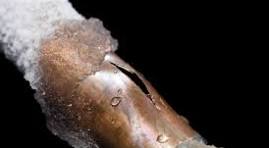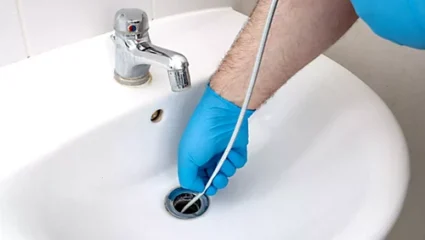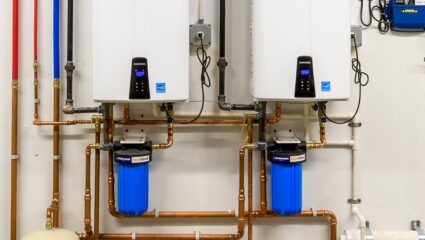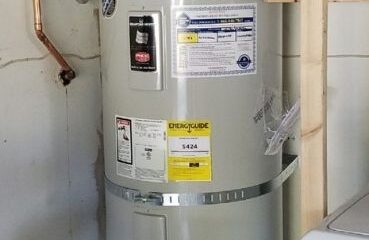How Deal with Frozen Pipes

How to Tell if Pipes are Frozen
It’s important to catch frozen pipes early to prevent damages. Typically, you will be able to boost your thermostat or talk a professional plumber before any damage occurs. However, here are a few signs that will help you identify if your pipe is frozen.
- No Water – An obvious sign that you have frozen pipes is if there’s a complete lack of water coming from your faucets or fixtures.
- Frost – If you can gain access to view your pipes, check to see if there is visible frost on them. Take note of which parts of the pipe has frost.
- Smell – If your pipes freezes, it will block food and waste down your drain, causing a backup and your room to begin to have a bad smell.
How to Tell if a Frozen Pipe has Burst
- Inspect the Inside of the Building. Go through each area of the building and look for actively dripping water and signs of water damage. Examine any exposed pipes and check them for frost or condensation. Especially keep an eye on rooms such as bathrooms, kitchens, laundry rooms, and unheated areas of the building.
- Turn on the faucets and flush your toilets. Ensure they are working and the water has no discoloration or smell to it. If there is only a slow trickle of water coming out, or no water at all, this might mean a frozen pipe has burst.
- Check your water meter. If all fixtures in the building are off and it still shows movement, this could be a sign of a burst.
- Check the exterior of the building. Look for water building up anywhere out of the ordinary, or sinkholes in your yard.
What to Do When A Frozen Pipe Bursts
Shut Off Water Supply
Make sure that you know where the main water valve is in case of emergencies, such as the bursting of a frozen pipe. You should shut it off right away. There are instances in which electricity must also be turned off in the area where the pipe has burst. If you live in an apartment complex, and can’t shut off the water supply on your own, then be sure to contact the landlord or building manager immediately.
Call Your Insurance Company
When something like this happens, make sure to call your homeowner’s insurance. Issues like this are often covered under your homeowner’s insurance policy. Your insurance agent will work with you to make sure you get the pipe fixed and your home repaired as needed.
Contact a Professional Plumber And A Water Damage Restoration Company
The next step is to contact a plumber. Keep in mind that not all plumbing companies offer 24-hour emergency services. It is recommended that you do your research, and find the contact number of a reliable plumber. That way you don’t just settle for who is available when your frozen pipe has burst.
Plumbing costs depend on where the pipes are found, and how bad the damage is. You will also need to call a water damage professional if there is severe water damage. Call GAC Company they can be reached at any time – by phone at 707-538-8000 or online.
Remove Water Right Away
It is important to clean up water right away to prevent mildew and mold buildup. You will need towels, buckets, mops, and a wet/dry vacuum. Do not wait for the plumber to remove the water for you, the longer you wait the more likely it is that you’ll get mold or severe water damage.
What Happens When a Pipe Freezes
When a pipe freezes, the water inside the pipe expands as it turns to ice, which can cause the pipe to crack or even burst. As the ice blockage grows, it can also cause increased pressure within the pipe, leading to further damage. If the pipe is a part of a closed system, such as a boiler or hot water heater, the increased pressure can cause serious damage to the equipment.
Once the pipe thaws, the water can start leaking into your home, leading to water damage, mold growth, and potential structural damage. It’s important to take immediate action if you suspect that a pipe has frozen to prevent costly repairs and potential hazards. To prevent pipes from freezing in the first place, consider adding insulation to the pipes and allowing a slow drip of water to run through the pipes during cold weather.
Prevent Frozen Water Pipes From Bursting
The easiest way to prevent pipes from bursting is to prevent pipes from freezing in the first place. There are a few things you can do to prevent pipes from freezing and bursting when it gets cold, but unfortunately there’s nothing practical for heating the ground around your home.
Avoid Extreme Temperatures
First off, make sure the temperature in your home is no lower than 55*F. If you are going to be gone for a long time, turn off your water with the shut off valve to prevent freezing and bursting.
Don’t Leave Still Water in Pipes
When the weather gets too cold, you should let water drip from your faucet. While the dripping might be irritating, this will help prevent water from freezing. You can detect a frozen pipe if the faucet stops working, or the toilet doesn’t refill.
Insulate Your Pipes
Another thing you can do to make sure your pipes don’t burst is to keep them well insulated. Make sure you insulate your indoor pipes residing in cold areas such as garages, attics, or basements, with a heated reflector light or expanding foam.
Proper insulation is important to keep pipes warm from the inside so they don’t freeze. Another option is to install a circulating pump that keeps the water temperature high enough to not freeze.
Why Do Pipes burst in Winter?
During winter, temperatures across the country can often dip to extremely low levels. These colder temperatures compound with the temperature of the water inside of pipes and cause them to freeze over. As water freezes and expands, it creates additional pressure on the inside of a pipe and often causes them to burst.
This is why it is important for homeowners to take proactive steps when it comes to winterizing their plumbing, such as ensuring all pipes in unheated areas of their home are insulated properly and avoid running warm or hot water through exterior exposed pipes. Taking these precautions can help reduce the chances of pipes bursting in icy winters.
What to do When Pipes Freeze
If your pipes are frozen, try thawing them yourself before it bursts. The most important thing is to find the place where the pipe is frozen. This can be extremely difficult since most often, the frozen areas of pipe are behind walls or in crawl spaces.
If you can’t find the frozen area, call a GAC Company as soon as possible. If you can find and access the area, use a heating pad, warm washcloth, hair dryer, or space heater to thaw it.
Never pour boiling water into a frozen pipe! If it thaws too quickly it will break. The quick change between hot and cold water will cause them to burst if they haven’t already.
You can use a heating pad, warm washcloth, hair dryer or a space heater. Or call GAC Company as soon as possible to handle it.
At What Temperature do Pipes Freeze?
Pipes begin to freeze at about 20 degrees Fahrenheit. This can happen even if it hasn’t been cold for too long. The likelihood of a frozen pipe bursting becomes higher when it gets below that 20 degrees, especially in southern climates!
Why Do Frozen Pipes Burst?
Frozen pipes burst due to temperatures constantly fluctuate throughout the day and frozen pipes may continue to contract (melt) and expand (freeze) throughout the day and night. This repetitive process can be damaging to your pipes even in a frozen state, and can run a risk of bursting even when frozen.
If the pipe has high water pressure or a large amount of water, there will be too much ice for the pipe, causing the pipe to break or burst.
These are the things that you need to do when experiencing frozen pipe damage. There’s no need to panic when it happens at your home or apartment and a pipe bursts. Just make sure you have the contact details of a reliable plumber or water damage professional like GAC Plumbing Company ready for emergency situations such as this.
Do Frozen Pipes Always Burst?
Although common, frozen pipes do not always burst. However, the ice can increase this risk when it thaws and is usually worsened as it raises pressure further which makes pipe bursting common near winter’s end or springtime. Furthermore, the more water flowing through the pipe, the greater chance of rupture. A ruptured pipe could lead to flooding, sewage backup, mold growth, structural damage, and other issues.
Taking Precautions with Frozen Pipe Damage
A burst pipe is one of the most common issues people face at home. There can be a number of reasons why pipes burst in harsh climate conditions such as extremely cold temperatures. Low to freezing temperatures can freeze the pipes, causing there to be frozen pipe damage and leading them to burst. Regardless of the type of pipes – whether they be metal or plastic, they can still expand or burst and cause water damage to your home. A burst pipe also requires a significant amount of costs in repairs. This is why it’s important to take all the safety measures to prevent pipes from bursting.
Below are some frequently asked questions and helpful steps to take to safely solve any problems you may be experiencing with your pipes at home.
Why Do Pipes Burst?
Typically, cold water causes your pipes to contract while frozen water causes pipes to expand. This inconsistency causes weaknesses in some parts and can cause the pipe to break or burst. The pipe’s inability to withhold the water pressures inside it causes the damage such as expansion and breakage.
Causes for burst pipes are, as mentioned above, frozen pipes and the movement (expanding and contracting) of pipes. Corrosion and clogs are other common causes for pipe damage.
How long before pipes burst?
The average time that damage can occur for a pipe in below freezing temperatures, is between 4 and 5 hours.
Can pipes burst without water?
Even if you have shut off the main water supply, a pipe can be at risk for damage. Specifically, if the temperature drops and the pipe has become frozen, it more than likely could become exposed to ice. As water freezes, it expands – and pipes can become vulnerable to this. Once cold air temperatures increase and ice melts, the pipes may move again, causing damage and the potential for leaks or breakage.
What to Do When a Pipe Bursts:
If you experience a bursting water pipe in your home, you can do a temporary emergency repair of the pipe
- Turn off the main water supply
- Contact a professional
- Quickly remove and clean excess water to avoid further water damage.
- Take pressure off pipes by draining the faucets
- Circulate warm air in your home to slowly thaw pipes
- Use a repair sleeve to temporarily cover the damaged area of the pipe
How long does it take to repair a broken pipe?
Depending upon the size and amount of damage to the pipes, repair can take several hours. For a short fix, it could take approximately anywhere from 2-4 hours.
Do pipes make noise when they burst?
Pipes can make noise when they burst water. Some reports are similar to that of a popping sound or (if you have metal pipes) possibly a loud clang of metal. However, when the moment happens and it may not be able to have been heard at the time of the damage. If you start to notice any noises or visible damage contact a restoration company for further inspection.
How to Clean a Water Pipe Line:
Essentially, the purpose of cleaning out your water line is to simply break down corrosion and sediments inside the pipes such as rust, lime or calcium. There are a few ways inexpensive ways to clean them out such as using a flushing kit, or vinegar with baking soda and hot water. You can also try to stay away from using heavy detergents when washing dishes and clothes, as these can leave chemical deposits in your water lines.
How to Get Air Out of Cold Water Pipes:
If you’ve ever experienced water spitting out of your faucets, it is simply air trapped inside the water line. Typically, what causes air getting into water lines is routine maintenance work on the water system. Briefly running water through your faucets can help with this.
Air in pipes can also cause noises inside the wall when fixtures are used. Luckily there is no dier problem and the solution is easy enough for a homeowner to fix. In just minutes, you can get rid of any air in your pipes; here’s what you can do to solve this issue:
- Turn off water supply
- Turn on faucets
- Start at the fixture closest to the main water supply
- Open each hot and cold faucet about halfway to let the air out
- Turn your water supply back on
- Turn off fixtures, faucets and appliances once water flows
- Close them in the same order they were opened
- The process can be repeated for toilets, showers, tubs, washing machine and dishwasher as well as water spigots outside the house.
What to Do When a Water Heater Bursts
It can be frustrating to experience a busted water heater. When properly functioning, the water heater should stop the flow of water when the tank gets full. Yet, when the pipe bursts, the tank pushes water out of the tank and onto your floors, causing damage.
It may not be that obvious or easy to detect. But, if you find yourself having issues with your thermostat, you may want to check the water heater to make sure there are no issues.
For your safety, it’s important to shut off the water supply and GAS or Electric supply. Then, call a professional to solve the issue. You can take photos of any damage you may have (for any possible insurance company claims) and safely clean up what you can before a specialist arrives.
How to Prevent Pipes from Freezing and Bursting:
Naturally, pipes that are constantly exposed to extreme weather conditions are more likely to freeze and burst. Keep this in mind and remember to always disconnect your shut off valves and turn them off before dropping temperature can take a toll on them. To minimize the risk, make sure you know where the shut off valve for your water is located and how you can safely operate it. This alone already saves you huge costs in repair and prevents high levels of water damage.
Another thing you can do to make sure your pipes don’t burst is to keep them well insulated. Make sure you insulate your indoor pipes that may be residing in cold areas – like garages, attics, or basements, Proper insulation is important to keep pipes warm from the inside so they don’t freeze and expand. To further avoid pipes from freezing, you can also install a circulating pump that keeps the water temperature moderate and warn.
You should ensure that there is no water lying in the pipes as still water can freeze and impair the quality of the pipes. For this, you will need to maintain a small, steady flow of water in your water taps. Try to turn the tap on from time to time in order to avoid water build up in the pipes. Similarly, keep the water well insulated every time of the day to regulate the temperature in pipes even when it’s not in use.
It’s very apparent that freezing conditions are one of the most common reasons for burst pipes. Following the above-mentioned measures is a good way to ensure that your pipes don’t burst. Still, you should regularly check your pipes and the entire water lines of your home to ensure that your home plumbing system is working smoothly.
Who can I call when a water pipe bursts?
So many scenarios can play out when it comes to a damage to your pipes. It may be a simple fix or it may require some professional assistance. Most importantly, if you’re not as familiar with some of your home’s plumbing or how it all works, it’s better to call a professional. Burst pipes have to be dealt with as soon as possible to avoid further problems to your home. So, it’s a good idea to call an expert from GAC Restoration and get your problems fixed right away.
Misconceptions About Frozen Pipes
Pipes Burst When They’re In The Process of Freezing
The bursting is tied to pressure rather than the ice. The frozen pipe is blocked, causing water pressure to build up behind it. Eventually, the pressure builds up enough that the pipe bursts.
When the ice begins to melt is when the pressure issues are often the worst. The pressure as the water rushes through the pipes can also cause bursting.
Northern Climates Are More Prone To Issues With Pipes Bursting
Generally, houses in northern climates are built with pipes located on the inside of the building insulation. This usually protects them from subfreezing weather, although extreme cold, insufficient insulation and holes that allow cold air to come into contact with pipes can still lead to freezing and bursting.
In typically warmer climates, however, pipes are more likely to be located in unprotected areas outside of the building insulation. Homeowners tend to be less aware of freezing problems, since they usually occur only once or twice a season.
Pipes Only Freeze if the Temperature Is Below 0 For Multiple Nights
Pipes begin freeze at about 20 degrees Fahrenheit, even if it hasn’t been that cold for long. However, when it gets below 20 degrees, the frequency of burst pipes becomes higher and you will see them more in southern climates.
Do All Frozen Pipes Burst?
Just because your pipe froze doesn’t mean you’ll end up with a mess. If you can carefully warm it up and thaw it, you may be able to prevent burst pipes.






